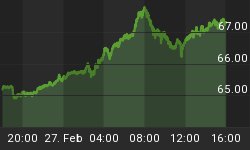Here's a forecast for you. Clear and direct. As quoted by a Reuters reporter in his January 15, 2009, article, entitled, "Global Lending Thaw May Yet Return to Deep Freeze."
"'This is a temporary respite and when it's over, the stock market will make new lows...,' says Robert Prechter, chief executive officer at research company Elliott Wave International in Gainesville, Georgia." [Reuters, 1/15/09]
But there are lots of forecasts out there - for the economy, for the Dow, for the price of oil, for the chances of the Boston Celtics repeating as NBA champions - so the question arises, how can you tell a good forecast from a bad one?
Bob Prechter addressed that very question with another reporter in a Q&A originally published in the book, Prechter's Perspective.
Editor's Note: For more market insights from Bob Prechter, visit Elliott Wave International to download Prechter's FREE 60-page Deflation Survival eBook, part of Prechter's NEW Deflation Survival Guide.
The following text was originally published in Robert Prechter's 2004 bestselling book, Prechter's Perspective.
Q: In general, is there any way for a person to tell a good forecast from a bad one?
Bob Prechter: There is a subtle way to tell a potentially useful forecast from a useless one. Most published forecasts are at best descriptions of what already has happened. I never give any forecast a second thought unless it addresses the question of the point at which a change in trend may occur.
As an example outside the financial markets: a sportswriter for the Atlanta Journal-Constitution published his ratings (scale 1-5) for each of the players on the Atlanta Braves baseball team as a forecast of how they would perform in 1984. At the start of the season, he rated 1983's Most Valuable Player a "5," Atlanta's slugger a "4," and the right fielder a lowly "2" due to bad performance in 1983 following two excellent years. Later in 1984, the MVP was batting only .215, and the slugger was batting a dismal .179, while the lowest-rated player, the right fielder, had hit 8 home runs and led the team in batting average and RBIs.
The point is not that the sportswriter was wrong in his predictions. The point is that he didn't make any predictions, even though he thought he did and said he did. He was merely rating the 1983 Braves in retrospect. He ignored possible bases upon which to forecast the 1984 season, things like motivation, new developments or events in a player's life, cyclic changes in playing success, etc. As with most forecasts, these things weren't even considered.
Read forecasts carefully. If they are mild-mannered extrapolations of a recent trend, it's probably the best policy to toss them aside and go search for something potentially useful.
Q: Obviously, the same holds true in finance.
Bob Prechter: All the time. When economists say, as they so often do, that they see "no reason to expect anything different" from the recent past, they mean it from the bottom of their knowledge. The linear projections they typically employ result in logic such as that expressed by an economist in a national newspaper, who said, "This rising consumer confidence is good news for the economy. Rising confidence spurs the economy, and the pickup in the economy then serves to heighten confidence." By this line of reasoning, no change of direction could ever occur. That's why, absent other knowledge, the only forecasts even worth your time considering are those that predict a change. Not because the forecaster is certain to be right, but because it shows that he is thinking and perhaps employing a tool that can anticipate trends.
Q: So the word "prediction" doesn't necessarily apply to the future!
Bob Prechter: Right. And it's those predictions about the future that are the tough ones. That's why economists stick to predicting the past, which is a crafty solution. It leads to misery among the people who follow them, but it doesn't seem to affect economists' jobs, so it certainly keeps them happy!
Q: Do you think that predicting the economy is possible?
Bob Prechter: It is not only possible, it is downright easy compared with predicting the stock market. One economist has gotten a lot of chuckles by saying that the stock market has predicted something like 19 of the last 13 recessions. However, that is only a reasonable statement if you believe that a certain rigid definition of a recession is the only one that is viable. In fact, if you look at the ebb and flow of economic activity and generally realize that it lags stock market activity of between 0 and 12 months, you will find that there is no better single indicator of what the economy is going to do than the stock market. Not only that, but even 19 out of 13 is infinitely better than any economist has ever done.
For more on deflation, download Prechter's FREE 60-page Deflation Survival eBook or browse various deflation topics like those below at www.elliottwave.com/deflation.
- What happens during deflation?
- Deflation survival
- Why is deflation bad?
- Deflation personal debt
- And much more in Prechter's FREE Deflation Survival Guide.















